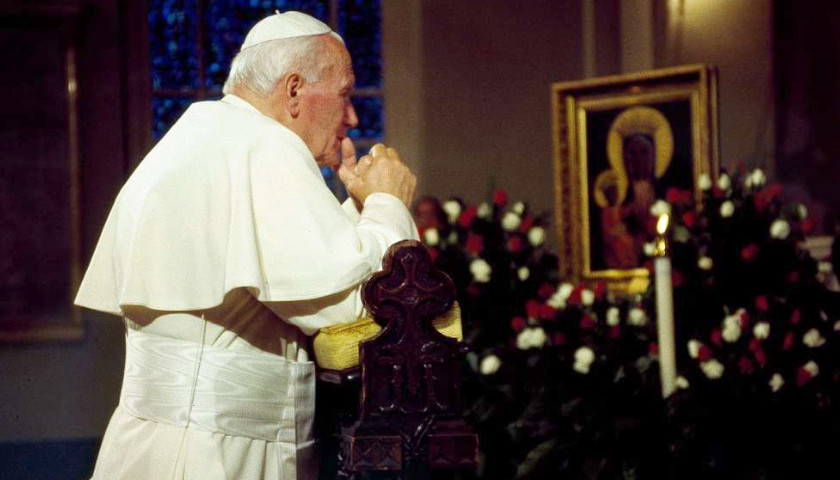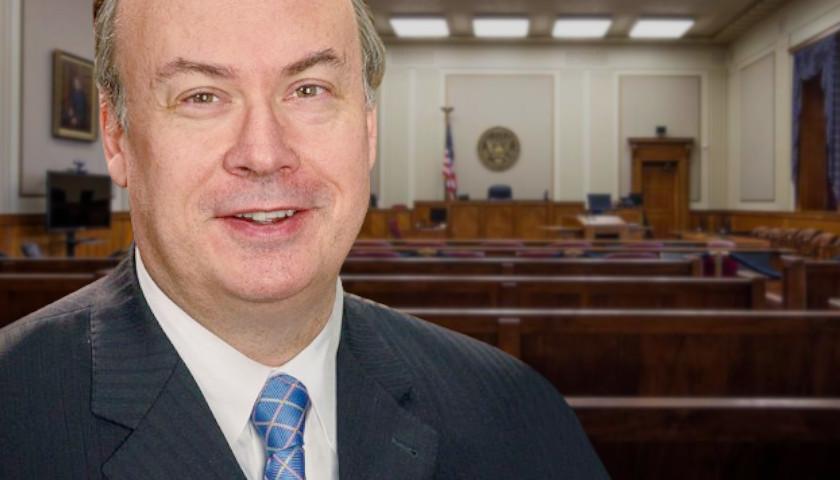by Ambassador Callista L. Gingrich, Gingrich 360
In recent weeks, slanderous allegations have been made against Saint John Paul II.
On Divine Mercy Sunday, a day established by John Paul II, Pope Francis defended his predecessor saying, “Certain of interpreting the feelings of the faithful throughout the world, I direct a grateful thought to the memory of Saint John Paul II, the object of offensive and unfounded inferences these past few days.”
Saint John Paul II’s commitment to faith, freedom, and human dignity made him one of the most influential men in modern history.
As George Weigel, John Paul II’s official biographer, wrote, “Shortly after the death of Pope John Paul II on April 2, 2005, Henry Kissinger told NBC News that it would be difficult to imagine anyone having had a greater impact on the twentieth century than the Polish priest and bishop who, on the night of his election in 1978, had described himself as a man called to Rome ‘from a far country.’”
Born in Wadowice, Poland, Saint John Paul II made history on October 16, 1978, when he was elected as the first non-Italian pope in more than 400 years. His encounters with fascism, anti-Semitism, and communism in his homeland shaped his lifelong opposition to evil.
At the height of the Cold War in June of 1979, Pope John Paul II embarked on a nine-day pilgrimage to Poland. As Newt and I highlight in “Nine Days that Changed the World,” this historic pilgrimage sparked a revolution of conscience that reshaped the spiritual and political landscape of the 20th century. Speaking to millions of Poles about truth, faith, and freedom, John Paul II reignited the spirit of the Polish people, which the communists tried to extinguish for decades.
The Holy Father later forged one of history’s most consequential diplomatic relationships with the United States in 1984. Through the leadership of President Ronald Reagan and Pope John Paul II, and the partnership between the United States and the Holy See, the Soviet Union was consigned to the “ash-heap of history” on December 25, 1991.
Throughout his pontificate, Saint John Paul II brought the message of the Gospel to every corner of the earth with a dynamic and lively missionary spirit. He travelled more than 725,000 miles to 129 countries and was greeted by the cheers of more than 150 million people.
He became an inspiration for young Catholics and established World Youth Day, which nearly four decades later, has become the largest international gathering on the Church’s calendar.
As Weigel wrote in “Witness to Hope: The Biography of Pope John Paul II,” “In its third millennium, John Paul II insisted, the Catholic Church must once again become the missionary enterprise it was at its very beginnings.”
The Holy Father encouraged a spiritual renewal of the Church during the Holy Year of the Redemption (1983-1984), the Marian Year (1987-1988), and the Year of the Eucharist (2004-2005). In 2000, he ushered in a new millennium for the Catholic Church during the Great Jubilee.
Throughout his pontificate, Pope John Paul II worked to foster peace and interfaith dialogue, namely among Jews, Muslims, and others. Notably, the Holy Father’s outreach resulted in the healing of Jewish-Catholic relations and the reestablishment of diplomatic relations between the Holy See and Israel.
Further, Saint John Paul II emphasized the universal call to holiness and canonized 482 saints, beatified 1,338 people, and expanded the College of Cardinals by creating more than 230 Cardinals.
Not only did his pontificate ignite a movement toward a more active and dynamic Church, but it also made numerous theological contributions. John Paul II promulgated the Catechism of the Catholic Church, reformed the Eastern and Western Codes of Canon Law, and wrote 14 Encyclicals, 15 Apostolic Exhortations, 11 Apostolic Constitutions, and 45 Apostolic Letters.
As Weigel wrote, John Paul II, “renewed the Catholic Church’s self-understanding, made the Church a pivotal player on the world stage in a host of venues, and set the evangelical course of Catholic life and mission in the third millennium of Christian history.”
The life and legacy of Saint John Paul II will endure and inspire generations to come.
– – –
For more commentary from Callista Gingrich, visit Gingrich360.com.







